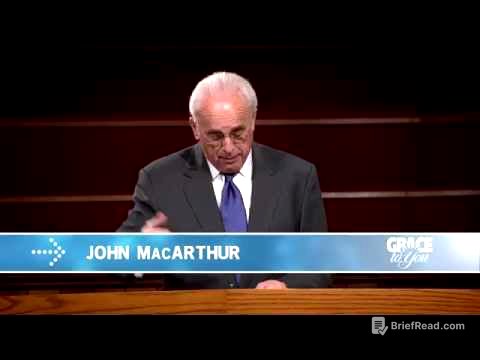TLDR;
This video provides a detailed overview of the Islamic economic system, contrasting it with capitalism and communism. It highlights the system's foundation in social justice, balancing freedom and equality, and emphasizing socioeconomic development. The discussion covers the ideological basis, key principles, and practical applications of Islamic economics, including the concepts of controlled capitalism and spiritual socialism.
- Islamic economic system balances freedom and equality through social justice.
- It incorporates both legal (controlled capitalism) and spiritual (spiritual socialism) dimensions.
- The system aims for socioeconomic development, ensuring prosperity benefits all members of society.
Introduction [0:00]
The video introduces the economic system of Islam, emphasizing its importance within the broader Islamic framework, which includes political, judicial, and social systems. It highlights the necessity of understanding the ideological foundations of existing economic systems, such as capitalism and communism, before exploring the Islamic economic model.
Ideological Basis of Existing Economic Systems [0:44]
Capitalism is based on materialism, allowing absolute ownership of property and wealth accumulation without obligatory spending on those in need. Communism, conversely, prohibits private ownership, advocating for state control over the means of production to ensure equality. Karl Marx's theory suggests that capitalism contains the seeds of its own destruction due to the exploitation of the proletariat by the bourgeoisie, leading to class realization and eventual overthrow.
Comparison: Capitalism vs. Socialism [4:23]
Capitalism prioritizes freedom, enabling individuals to earn and own property without restrictions, but often results in inequality. Socialism aims for equality through state ownership and control, but at the cost of individual freedom and incentive. Islam, however, seeks to balance freedom and equality through justice, preventing the concentration of wealth and ensuring basic needs are met for all.
Ideological Basis of the Islamic Economic System [12:26]
The Islamic economic system is rooted in social justice, advocating for both freedom and equality within the bounds of Islamic law (Sharia). It recognizes private property rights but imposes restrictions to prevent absolute ownership and promote equitable distribution of wealth. The system aims for socioeconomic development, ensuring that economic prosperity translates into improved living conditions for all members of society, not just the wealthy.
Defining Islamic Economics [19:58]
Islamic economics is defined as the application of Sharia principles to prevent injustice in the acquisition and disposal of material resources, aiming to satisfy human needs and enable individuals to fulfill their obligations to Allah and society. It emphasizes just socioeconomic development, reducing inequality and ensuring that economic prosperity benefits everyone, not just a privileged few. The system seeks to provide peace of mind and enable individuals to fulfill their responsibilities to both the world and Allah.
Interlink between Economic System of Islam and Social Justice [26:30]
The Islamic economic system is intrinsically linked to social justice, ensuring that economic prosperity is distributed equitably. Without fair distribution, wealth becomes concentrated, leading to social chaos and class divisions. Islam aims to prevent a situation where a vast majority of society is forced to live like animals, focused solely on survival, while a few enjoy extreme luxury. The system promotes the idea that those with resources should ensure that those without have access to basic necessities, fostering a society where everyone can live with dignity and purpose.
Islamic Economics: Na Aashi [31:44]
Islamic economics, referred to as "Na Aashi," consists of two parts: a legal (Fakkahi Nizam) and a spiritual part. The legal system involves controlled capitalism, allowing private ownership with restrictions such as Zakat (obligatory charity). The spiritual system embodies spiritual socialism, emphasizing that all wealth belongs to Allah and encouraging individuals to prioritize the needs of others.
Principles of Spiritual Dimension of Islamic Economics [37:25]
The principles of the spiritual dimension of Islamic economics include the belief that everything belongs to Allah, who is the ultimate provider of wealth and sustenance. It encourages individuals to keep only what they need for basic necessities and to give the rest in charity. The distribution of wealth is seen as Allah's prerogative, with those who have more being responsible for caring for those who have less.
Legal or Ethical Principles of Islam [43:19]
The legal or ethical principles of Islam, also known as controlled capitalism, allow private ownership and investment but with certain restrictions. Property ownership is not absolute, and Zakat must be paid on wealth. The system recognizes the existence of haves and have-nots but ensures that inequality remains within acceptable limits. Zakat is forcefully recovered from those who do not pay, and its distribution is ensured to reach the poor.
Controlled Capitalism and Spiritual Socialism [46:36]
While spiritual socialism encourages individuals to give beyond their needs, controlled capitalism legally allows individuals to save and invest after paying Zakat. Islam encourages earning, saving, and investing, but prohibits certain forms of investment, such as those based on interest (riba) and gambling. The system aims to control inequality through the circulation of wealth and restrictions on certain business practices.
Features of Economic Systems of Islam [52:54]
The Islamic economic system seeks moderation between the extremes of capitalism and communism, maintaining the good features of both while abandoning their evils. It balances individual freedom with social responsibility, promoting both individual initiative and state responsibility. The system emphasizes lawful earning, prohibits racism and extreme materialism, and ensures the right to own and build property through legitimate means.
Principles and Guidelines [1:01:35]
Islam promotes trade but prohibits interest-based transactions, as interest promotes inequality and benefits only the lender. The system encourages charity and selflessness, contrasting with the greed and selfishness associated with interest. Inequalities are accepted within reasonable limits, and the system provides guiding principles for both production and consumption. It is based on principles of social welfare, ensuring the circulation of wealth and providing liberty to earn through legitimate methods.









